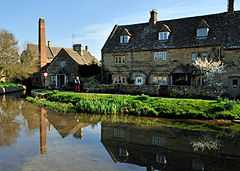Lower Slaughter
| Lower Slaughter | |

|
|
 Lower Slaughter | |
| OS grid reference | SP1638422561 |
|---|---|
| District | Cotswold |
| Shire county | Gloucestershire |
| Region | South West |
| Country | England |
| Sovereign state | United Kingdom |
| Post town | CHELTENHAM |
| Postcode district | GL54 |
| Dialling code | 01451 |
| Police | Gloucestershire |
| Fire | Gloucestershire |
| Ambulance | Great Western |
| EU Parliament | South West England |
| UK Parliament | The Cotswolds |
| |
Lower Slaughter is a village in the English county of Gloucestershire, located in the Cotswold district, 4 miles (6.4 km) south west of the town of Stow-on-the-Wold.
The village is built on both banks of the River Eye, which also flows through Upper Slaughter. At the west end of the village there is a 19th-century water mill with an undershot waterwheel and a chimney for additional steam power. There is a ford where the river widens in the village and several small stone footbridges join the two sides of the community. While the mill is built of red brick most of the 16th and 17th century homes in the village use Cotswold sandstone and are adorned with mullioned windows and often with other embellishments such as projecting gables.
Records exist showing that Lower Slaughter has been inhabited for over 1000 years. The Domesday Book entry has the village name as “Sclostre”. It further notes that in 1066 and 1086 that the manor was in the sheriff's hands.[1]
Lower Slaughter Manor, a Grade-II listed 17th-century house, was granted to Sir George Whitmore in 1611 and remained in his family until 1964.
The 13th century Anglican parish church is dedicated to St. Mary the Virgin. Much of the current structure was built in 1866; however, the spire and peal of six bells was recently restored.[2]
In May 2013 it was reported in the national news that the Parish Council were fiercely opposed to the presence of an icebox tricycle selling ice creams for seven days a week, six months of the year, citing that the trading times were excessive, increased footfall would prevent the grass from growing and that children could climb on the trike and fall into the nearby river.[3]
References
- ↑ C. R. Elrington (editor) (1965). "Parishes: Lower Slaughter". A History of the County of Gloucester: volume 6. Institute of Historical Research. Retrieved 24 April 2011.
- ↑ "Cotswold District Council Online". Retrieved 25 April 2011.
- ↑ "The Telegraph". Retrieved 6 May 2013.
External links
| Wikimedia Commons has media related to Lower Slaughter. |